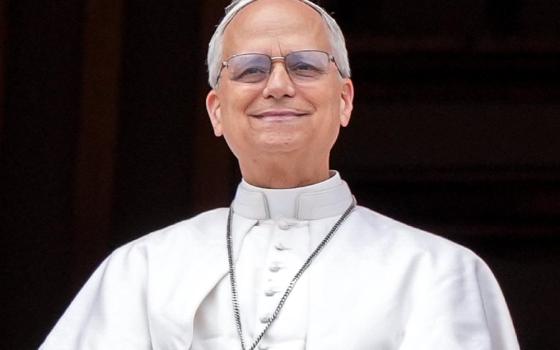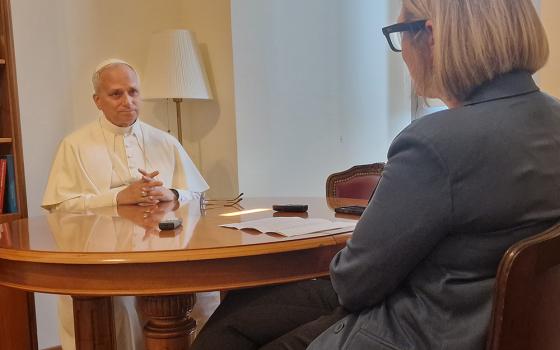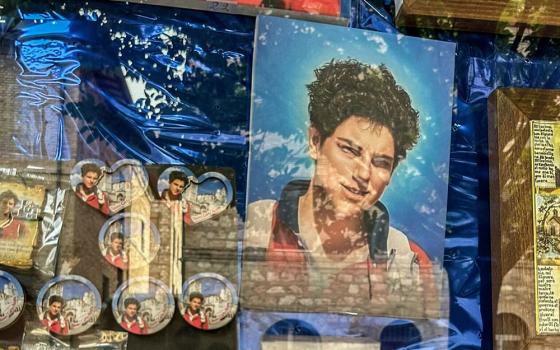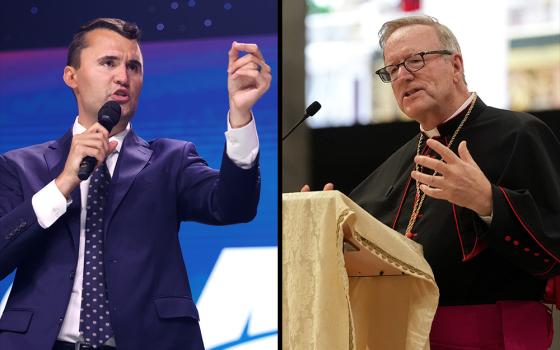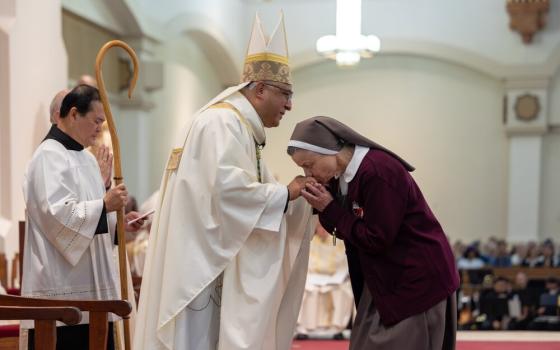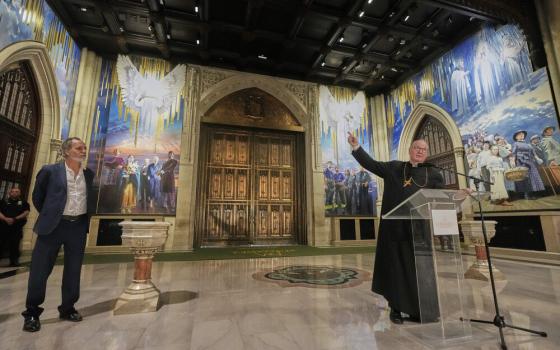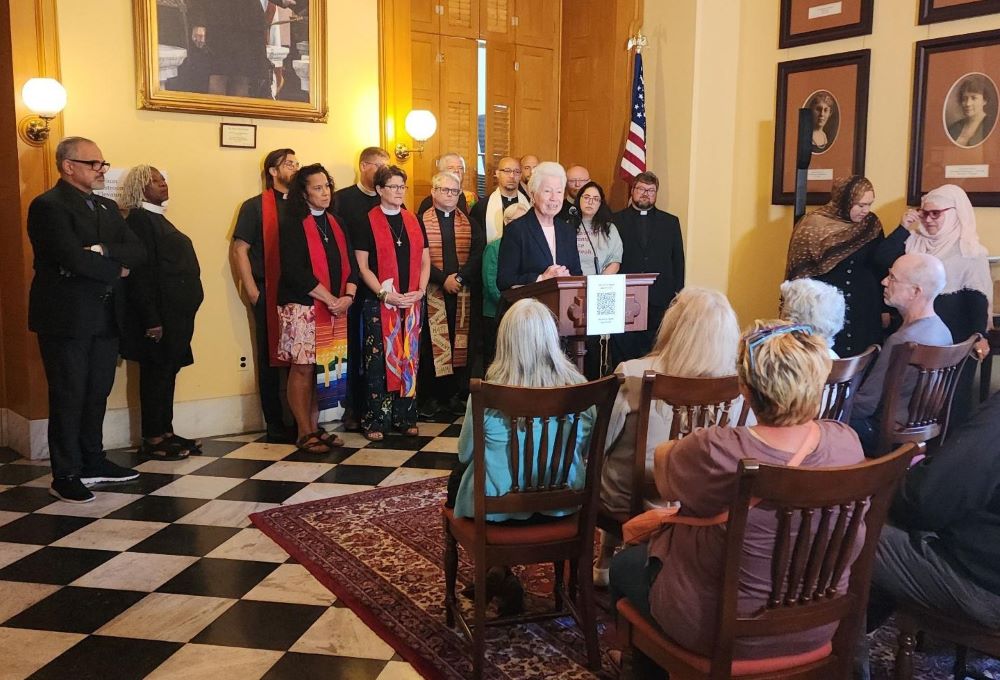
Dominican Sr. of Peace Gemma Doll calls on Ohio Governor Mike DeWine to intervene in the Ayman Soliman case at the Ohio Statehouse Aug. 25. Soliman, who is from Egypt, was granted asylum in 2018. His status was revoked on June 3 and he was detained July 9. (Ohio Immigrant Alliance)
When U.S. immigration authorities detained Imam Ayman Soliman at a routine check-in July 9, the outcry was swift. Known as the "interfaith imam" for his work at Cincinnati Children's Hospital and a local mosque, Soliman's case has inspired hundreds to protest, pray and plead for his release.
"We are just a country that is breaking promises," said Dominican Sr. of Peace Gemma Doll of Columbus, Ohio.
Doll joined faith leaders and other community advocates decrying the detention Aug. 25 at the Ohio Statehouse. The group — which included The Undivided, a racial justice group; Center for American Islamic Relations-Ohio; Young United Souls for Revolutionary Action, a Muslim-led group; Ohio Immigrant Alliance — delivered a letter signed by 1,166 people to Ohio Governor Mike DeWine urging him to intervene in Soliman's case.
"Governor DeWine, you have the ability, the opportunity to make Ohio shine as a righteous state, a moral state, not one that gives way to immoral and unfair treatment of a person," Doll said in a press release from the Ohio Immigrant Alliance.
Soliman and his fate have become a rod among faith groups and activists in Ohio amid Trump's mass deportation effort. Faith leaders said that for those who believe in human dignity, Soliman's case has become a test not just of one man's fate, but of the values his supporters say America — and people of faith — are called to defend.
"I think our whole sense of human dignity and the individual rights, human rights, enter into this," said Franciscan Fr. Al Hirt, pastor of St. Francis Seraph Catholic Church in Cincinnati. "It seems wrong. The bishops have been pretty good about support for immigration reform and doing it justly but it would sure be nice to see a little bit more Catholic voice supporting a person like this."
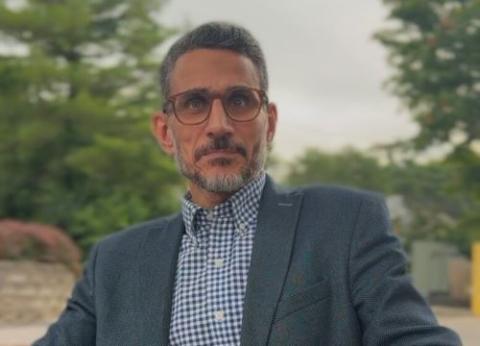
Ayman Soliman, a former chaplain at Cincinnati Children's Hospital, was detained by ICE agents July 9. (Courtesy of CAIR-Ohio)
Hirt signed an interfaith clergy letter backing Soliman. The Franciscan priest said it is important for Catholics to speak up in the face of all injustice, but particularly cases like Soliman's.
"I just could not find any reason why this imam lost his asylum status," said Hirt, who has worked in parishes in Cincinnati for 35 years. "It just doesn't make sense. It's just another good person being rounded up, detained, not a criminal. He's not done anything wrong."
Soliman, 51, came to the United States in 2014, fleeing Egypt after he was jailed and beaten for his journalism during the Arab Spring, pro-democracy and anti-government protests that started in 2011.
Soliman won asylum in the U.S. in 2018 under the first Trump administration. In the final month of the Biden presidency, immigration authorities moved to revoke it. Officials cited Soliman's past work with an Egyptian charity with ties to the Muslim Brotherhood, though neither Egypt nor the U.S. lists the group as a terrorist organization. Court records show after Trump returned to office officials formalized the terrorism charges and his asylum was revoked on June 3.
Immigration and Customs Enforcement agents detained Soliman at a routine check-in in July. He is challenging the change in his asylum status in court and has won a legal battle to remain in the Butler County Jail near Cincinnati, Ohio, while his case progresses.
Soliman's most recent hearing took place Sept. 3 in Cleveland Immigration Court. An immigration court hearing Sept. 25 will address the merits of his asylum claim.
Doll cited her faith in calling for help for Soliman.
"Our Catholic faith that unites us, Governor DeWine, stands firmly that every human person has the right to life, has a right to dignity," Doll said. "That is not what Ayman is getting. He is being dismally treated and it's wrong. It's morally wrong, and you know it. So please, in the name of God, stand up for this human life."
Rev. Joel Miller of the Columbus Mennonite Church invoked Scripture stories that call for fair treatment of immigrants, and Jesus' admonition to love our neighbor as ourselves.
"Our faith absolutely compels us to remember who we are and to act accordingly," Miller said. "That's why we're here today in support of Imam Soliman. He is both the good Samaritan and the foreigner, who as a chaplain has tended to the needs of the hurt and even the dying, the very model of a neighbor."
Bilal Ahmed, an attorney with the Center for American Islamic Relations in Ohio who has worked on Soliman's case, noted that earning asylum status is no easy feat.
"Getting asylum is a yearslong process. There's a number of different hoops you have to go through,” Ahmed said. “You're vetted at every single level. He had passed the asylum threshold and was on the verge of getting his green card, but it was stalled for a number of years … It is concerning to say the least."
Ahmed said the support Soliman has received from the local community has been heartening.
"I went down to Cincinnati on the day that he was unfortunately detained and just everyone was coming out of nowhere," Ahmed said. "All these people were showing up in support … Since then, there's been a whole coalition in Ohio trying to get him released.
"I was shocked that all these people knew Imam Ayman," Ahmed added. "That's a testament to his interfaith work in the community. He's just going out and helping people regardless of their religious backgrounds."
Advertisement
Among the many speaking out for Soliman was Rev. Adam Allen, a former Cincinnati Children's Hospital chaplain who said he lost his job after participating in a July 17 prayer vigil for Soliman. He worked side by side with Soliman, visiting children and families experiencing difficult times.
"I proudly worked to be the best chaplain that I can be, but Ayman is on a whole other level that I can only aspire to be," Allen said.
During his first week at the hospital, Allen shadowed Soliman.
"He moved fast," Allen said. "He was hard to keep up with. We'd meet with one family, he'd calmly assess their spiritual needs, learn what they were going through, pray with them, and bring them hope. He would move so fast."
Allen noted Soliman has a pacifying impact on patients. "Once he had entered the room, all this calm and peace would come with him," Allen said. "Then we'd move on immediately to the next patient. It felt like we were running."
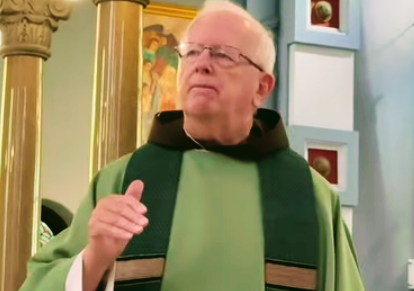
Franciscan Fr. Al Hirt, pastor of St. Francis Seraph Church in Cincinnati, delivers a homily Aug. 17 at his parish. (Courtesy St. Francis Seraph Church)
Soliman speaks Arabic, Spanish and English.
"When an Arabic-speaking family was approaching a difficult prognosis, he would leave the team a note saying, call me anytime, no matter what hour, and I will come in to support this family and he meant it," Allen said. "I would have to tell new people. He really means it. That's what he wants. He'll be upset if you don't call him."
Outside the hospital Soliman led a biweekly halaqah, or study circle, for Muslim students at the University of Cincinnati, taught the Quran to young Muslims and worked to make sure other volunteers at his mosque were recognized for their contributions.
Soliman also served on Cincinnati Children's ethics committee. Soliman holds master's degrees in Islamic studies and Muslim chaplaincy and is a doctoral candidate in the same field. His focus is on interfaith, islamophobia and bioethics. Soliman has served as an imam for over two decades and is a member of the Assembly of Muslim Jurists of America.
Tala Ali, a close friend who attended the same mosque and worked with Soliman in the Association of Muslim Chaplains, said she speaks to Soliman in jail every day. She said he has good and bad days but is encouraged by those telling his story.
"He said, 'I just want you to talk about me; to remember me.' Knowing he's not forgotten is what's keeping him alive and hanging on. He's got so many letters from people who have sent him Quran verses, Bible verses, sharing stories, sharing their prayers. … That has meant the world to him."
Ali was there when Soliman was taken into custody and has been at the forefront of supporters telling his story ever since.
"I shouldn't have to sell a person for them to have their basic human dignities and rights recognized," she said. "He fights so hard and cares so hard for everyone else's kids, and he has been through what he's gone through and he's so soft.”
As Soliman awaits his next hearing, his friends and supporters say they will continue to speak out, pray and rally for his release.
"He just gives and gives and gives," Ali said. "He holds himself up to a standard that is so high without demanding those standards of others."

